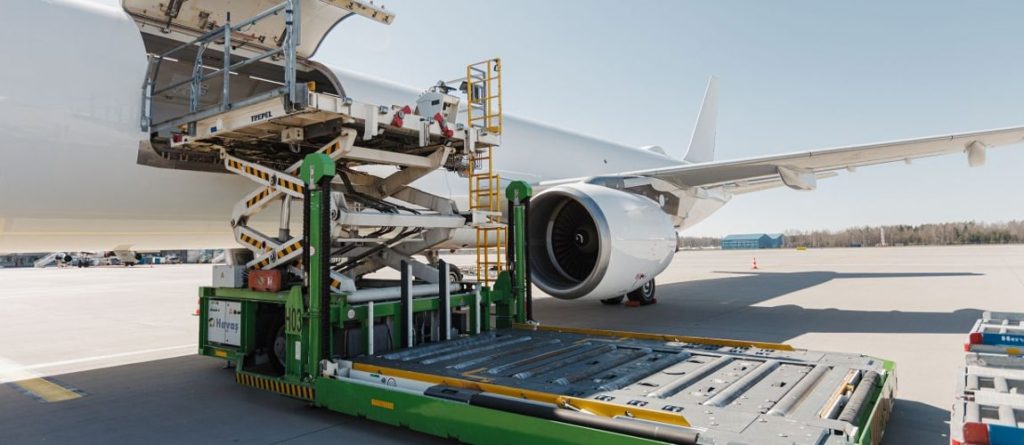
Introduction
In today’s globalized world, the efficient movement of goods is crucial for businesses and economies to thrive. While sea transport has been a longstanding and reliable mode of transporting cargo, air cargo has gained significant prominence in recent years.
This shift towards air cargo is not a mere trend; it’s a reflection of the unique advantages that air freight offers over marine cargo. In this blog, we will explore why air cargo leads the way in cargo transportation, highlighting its speed, reliability, flexibility, and environmental benefits.
I. Speed: The Need for Speed in Modern Logistics

When it comes to transporting goods, time is often of the essence. Air cargo stands out for its unparalleled speed. In a world where businesses operate on tight schedules and customers expect fast delivery, air freight has become the preferred choice for high-value and time-sensitive shipments.
Lightning-Fast Transit Times Air cargo is unbeatable when it comes to transit times. While ships can take weeks to transport cargo across oceans, air freight can cover the same distance in a matter of hours. This speed advantage allows businesses to respond swiftly to changing market demands and maintain just-in-time inventory management.
Reduced Lead Times Air cargo’s shorter lead times enable companies to minimize storage costs and reduce the need for extensive warehousing. This efficiency can significantly improve the cash flow and profitability of businesses.
II. Reliability: Keeping Cargo Safe and Sound
Reliability is a paramount concern for businesses, and air cargo consistently outshines marine cargo in this aspect.
Reduced Risk of Damage Air cargo is subject to fewer handling points than marine cargo. With fewer opportunities for damage or loss, businesses can have greater confidence in the safety of their goods during transit.
Weather-Resistant Unlike sea transport, which is susceptible to adverse weather conditions, air cargo is far less affected by the elements. This means fewer delays and more dependable delivery schedules.
III. Flexibility: Adapting to Changing Needs
In today’s dynamic business landscape, adaptability is key. Air cargo’s flexibility is a significant advantage.
Quick Response to Market Changes Air cargo allows businesses to react swiftly to shifts in demand or supply chain disruptions. When unforeseen circumstances arise, air freight can provide a lifeline to keep operations running smoothly.
Diverse Range of Cargo Air cargo is suitable for a wide range of products, from perishable goods like fresh produce and pharmaceuticals to high-value items like electronics and luxury goods. This versatility makes it an attractive choice for businesses across industries.
IV. Environmental Benefits: A Greener Way to Transport Goods

In recent years, sustainability has become a top priority for businesses and consumers alike. Air cargo may seem less eco-friendly at first glance, but it has its own set of environmental benefits.
Lower Carbon Emissions per Kilometer While air cargo is responsible for higher emissions per ton of cargo compared to marine cargo, it makes up for this with its shorter travel distances. When looking at emissions per kilometer, air cargo often comes out as the greener option.
Reduced Inventory Holding Air cargo’s speed and reliability allow businesses to maintain leaner inventory levels, reducing the need for energy-intensive warehousing and storage facilities.
Alternative Fuel Initiatives The aviation industry is actively pursuing the development of alternative fuels and more fuel-efficient aircraft. These efforts aim to further reduce the environmental impact of air cargo transportation.
In a world where the keyword “air cargo” represents not just a mode of transportation but a solution for modern logistical challenges, its prominence is well-deserved. Businesses that harness the power of air cargo are better equipped to meet the demands of their customers, respond to market changes, and contribute to a more sustainable future.
So, when it comes to the race between air cargo and marine cargo, it’s clear that air cargo is soaring high, leading the way for the future of logistics.
Remember, whether you’re transporting fresh flowers, the latest smartphones, or life-saving medical supplies, air cargo is the fast and reliable choice that keeps your business ahead of the competition.
The Essence of Time-Critical Logistics
In the realm of cargo transportation, time is currency, and air cargo is the ultimate time-keeper.
Rapid Transit Times The hallmark of air cargo is its astounding speed. While marine cargo vessels traverse oceans over weeks, air freight can span the same distances in mere hours. This accelerated pace empowers businesses to meet dynamic market demands and maintain agile inventory management.
Minimized Lead Times Air cargo’s abbreviated lead times translate into reduced storage expenses and diminished reliance on extensive warehousing facilities. This operational efficiency significantly bolsters businesses’ cash flow and overall profitability.
Safeguarding Cargo in the Skies
Reliability is the bedrock of cargo transportation, and air cargo has an unblemished track record.
Mitigated Risk of Damage Air cargo undergoes fewer handling points compared to its marine counterpart, resulting in fewer opportunities for cargo damage or loss. This heightened safety factor instills confidence in businesses regarding the security of their goods during transit.
Weather Resistance Unlike sea transport, which is susceptible to unpredictable weather conditions, air cargo is far less affected by natural elements. This translates to fewer delays and a more dependable delivery schedule.
Adaptability: Meeting the Ebb and Flow of Demand
In today’s ever-shifting business landscape, adaptability is not merely a virtue but a necessity. Air cargo stands out for its adaptability.
Agile Response to Market Shifts Air cargo empowers businesses to react promptly to changes in demand or supply chain disruptions. When unforeseen circumstances arise, air freight acts as a lifeline to ensure the smooth continuity of operations.
Versatile Cargo Handling The versatility of air cargo shines through as it accommodates a diverse range of products, from perishable items like fresh produce and pharmaceuticals to high-value commodities like electronics and luxury goods. This adaptability makes it an attractive choice for businesses across various industries.
Environmental Responsibility: The Greening of Air Cargo
In an era where sustainability is paramount, air cargo is making strides in environmental responsibility.
Lower Carbon Emissions per Kilometer While air cargo may appear less eco-friendly on a per-ton basis compared to marine cargo, it compensates by traveling shorter distances. When examining emissions per kilometer, air cargo often emerges as the more environmentally conscious option.
Reduced Inventory Holding Air cargo’s efficiency in speed and reliability allows businesses to maintain leaner inventory levels, reducing the need for energy-intensive warehousing and storage facilities.
Sustainable Fuel Initiatives The aviation industry is actively engaged in developing alternative fuels and enhancing aircraft fuel efficiency. These endeavors aim to further mitigate the environmental impact of air cargo transportation.
Conclusion: The Ascendancy of Air Cargo
In the dynamic landscape of global logistics, air cargo has rightfully claimed its position as the preferred choice for many businesses. Its unparalleled speed, unwavering reliability, remarkable adaptability, and growing commitment to environmental sustainability make it the superior option for an array of cargo transportation needs.
In a world where “air cargo” symbolizes not just a method of transport but a comprehensive solution to contemporary logistical challenges, its prominence is indisputable. Enterprises that harness the potential of air cargo are better equipped to satisfy customer demands, navigate shifting market dynamics, and contribute to a more sustainable future.
So, in the ongoing competition between air cargo and marine cargo, it’s evident that air cargo continues to ascend, charting the course for the future of global logistics.
Whether transporting delicate orchids, cutting-edge smartphones, or life-saving medical supplies, air cargo represents the swift and reliable choice that keeps your business soaring above the competition.

 07424380227
07424380227